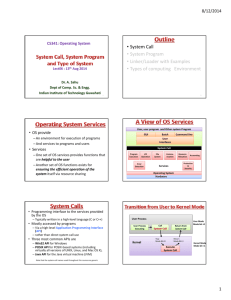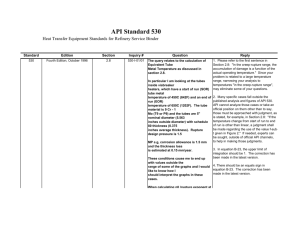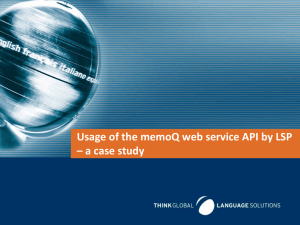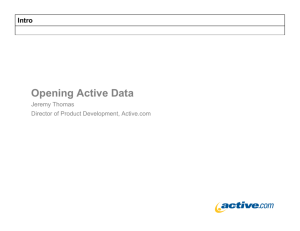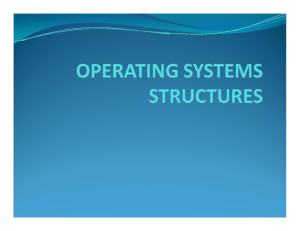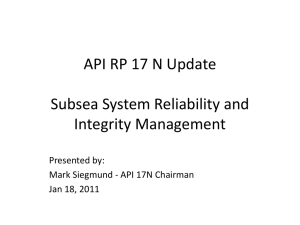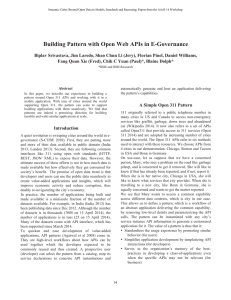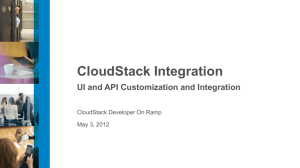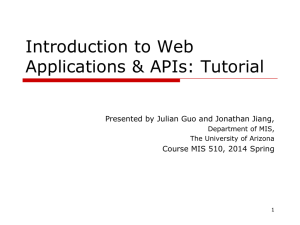Operating Systems and Networks
advertisement
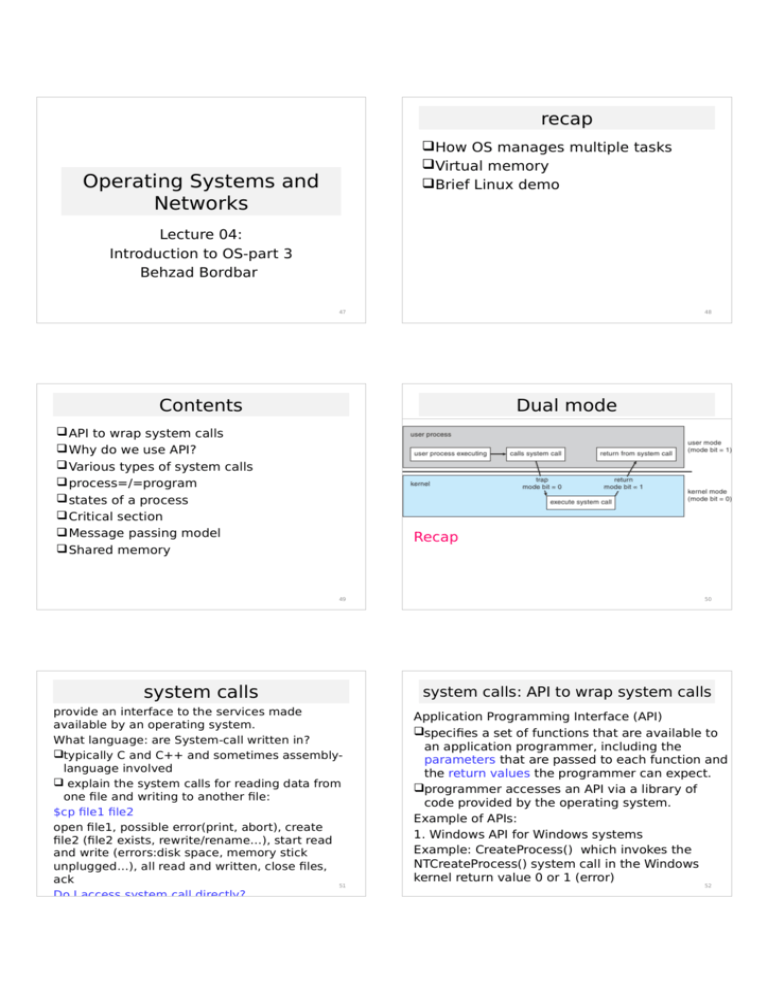
recap How OS manages multiple tasks Virtual memory Brief Linux demo Operating Systems and Networks Lecture 04: Introduction to OS-part 3 Behzad Bordbar 47 48 Contents Dual mode API to wrap system calls Why do we use API? Various types of system calls process=/=program states of a process Critical section Message passing model Shared memory Recap 49 system calls provide an interface to the services made available by an operating system. What language: are System-call written in? typically C and C++ and sometimes assemblylanguage involved explain the system calls for reading data from one file and writing to another file: $cp file1 file2 open file1, possible error(print, abort), create file2 (file2 exists, rewrite/rename…), start read and write (errors:disk space, memory stick unplugged…), all read and written, close files, ack 51 Do I access system call directly? 50 system calls: API to wrap system calls Application Programming Interface (API) specifies a set of functions that are available to an application programmer, including the parameters that are passed to each function and the return values the programmer can expect. programmer accesses an API via a library of code provided by the operating system. Example of APIs: 1. Windows API for Windows systems Example: CreateProcess() which invokes the NTCreateProcess() system call in the Windows kernel return value 0 or 1 (error) 52 system calls: API (continue) system calls: API (continue) Example of APIs: 2. POSIX API for POSIX-based systems (UNIX, Linux, and Mac OS X) programmer accesses an API via a library of code provided by the operating system. Example: read input: int fd: file descriptor to be read void *buf: pointer into buffer to be read into size_t count: maximum number of bytes to read output: number of bytes read (if success) -1 if fail UNIX and Linux for programs written in the C language, the library is called libc. 53 Example of APIs: 3. Java API for programs that run on the Java virtual machine. getParentFile() invoked on a file object. output: Returns the abstract pathname of this abstract pathname's parent, or null if this pathname does not name a parent directory. JVM uses the OS system calls. 54 What happens when a user prog. makes a system call why do we use API? Why not invoking actual system calls directly? Program portability: program can compile and run on any system that supports the API system calls can often be more detailed and difficult to work with give access to high level objects (java API) Do you know interfaces in java? using system calls is like implementing an (or many) interfaces caller only needs to know the signature! method call and parameters are passed into a registers values saved in memory for example on table or stacks but addresses in registers Stack is preferred because do not put limit on the number of parameters stored. 55 Different types of system call 56 System call: process control process =/= program an instance of a running program (two process can be associated to the same program). end, abort load, execute create process, terminate process get process attributes, set process attributes wait for time wait event, signal event allocate and free memory We will discuss some of these. process control file manipulation device manipulation information maintenance communications protection. 57 58 end and abort load(), execute(), createProcess() Stopping a running program: normal: end() abnormally: abort(). abnormally: division to zero, file not available: a dump of memory is created for debugging (code has problem) finding cause (unauthorised access) Exercise: read about stdout and stderr $firefox will result in loading of firefox from another program (terminal) Two issues what happens when loading program terminates? should I keep the current program running? (backgroud program &) 59 Creating and managing processes 60 Critical section this file is being modified by another program! Critical section: two or more process access the same data… one must access at a time operating systems often provide system calls allowing a process to lock shared data. Then, no other process can access the data until the lock is released. acquire_lock() and release_lock() Hard topic: semaphore and monitors If we create a process we can control its execution getting attributes setting attributes maximum allowable execution time terminate process if we find that it is incorrect or is no longer needed wait for an event to happen wait_event() and take action signal_event() 61 File Management 62 Device management create file, delete file open, close read, write, reposition get file attributes, set file attributes process may need multiple resources to execute: Example: access to particular disk request device, release device read, write, reposition get device attributes, set device attributes logically attach or detach devices 63 64 Information maintenance Communications get time or date, set time or date get system data, set system data get process, file, or device attributes set process, file, or device attributes How does two process communicate? message-passing model shared-memory model 65 message-passing model 66 shared memory Java program (one process) connecting a database (second process) to read/write data (JDBC) Before message, a connection must be opened. Naming: host id and id of the process running on the host Connection created and open() permission for communication to take place with an accept connection() call. processes involved are called client and server read_message() and write_message() system calls. close_connection() sys. call terminates communication. shared black board model processes gain access and read and write to a shared part of memeory operating system prevent one process from accessing another process’s memory. For shared memory two or more processes agree to remove this restriction. Who ensures two process do not read and write same location simultaneously: the two processes. Thread (thread =/= process =/= program) 67 Communications 68 protection No matter shared-memory or messagepassing, the following system calls are supported: create, delete communication connection send, receive messages transfer status information attach or detach remote devices 69 mechanism for controlling access to the resources: file, devices, processes, … Mostly designed around access control (remember practical lecture) get permission set permission allow_user deny_user 70 system program vs applications system program vs applications System programs (utilities) convenient environment for program development and execution interfaces to system calls Examples: • File management. • Status information • File modification. • Programming-language support… OS are often supplied with applications : programs that are useful in solving common problems or performing common operations. Example: database, compiler, game… 71 summary various types of system call Process and differences between process and program stack and heap process state and control block … now we know what is saved when switching context. 73 72
